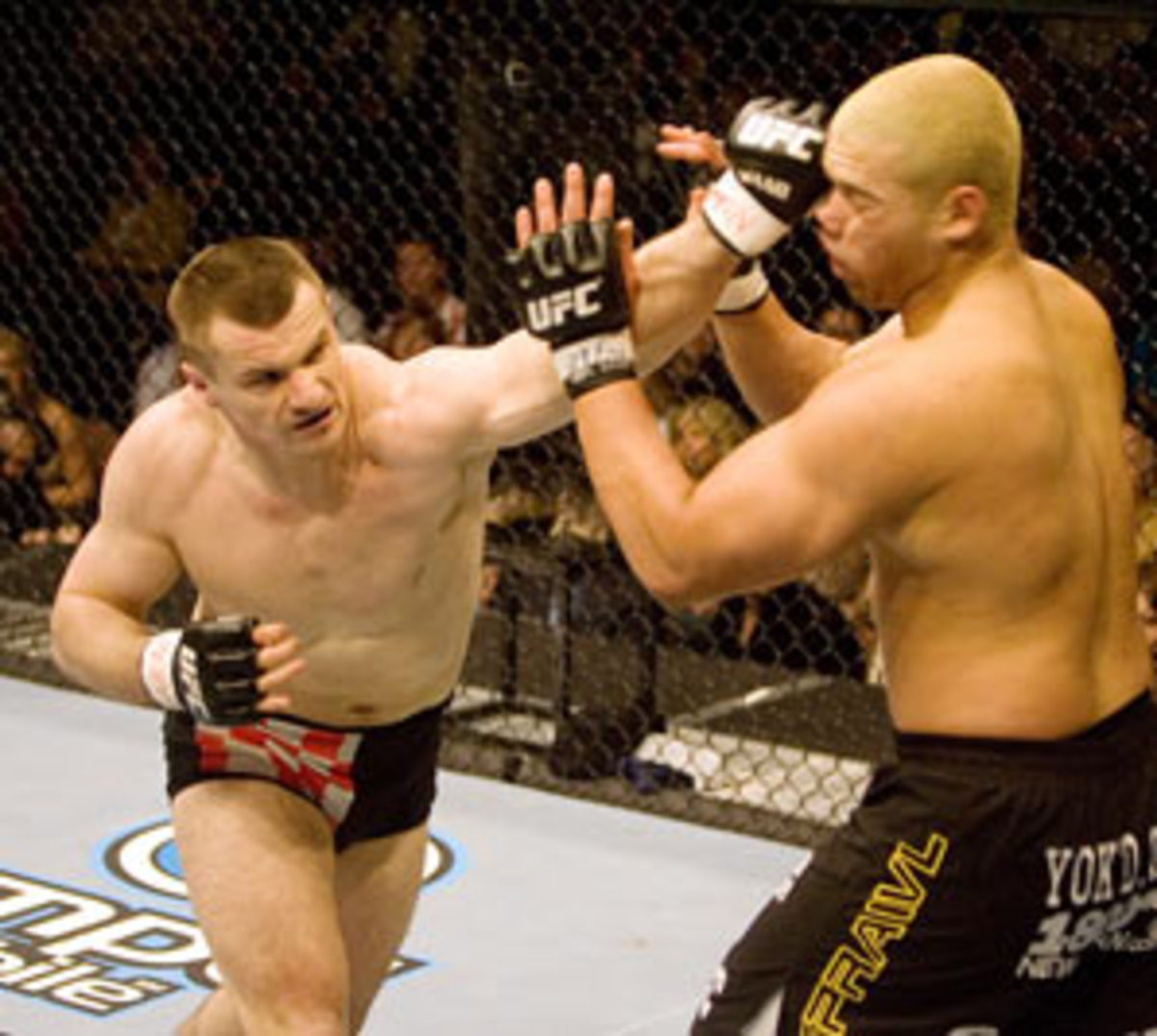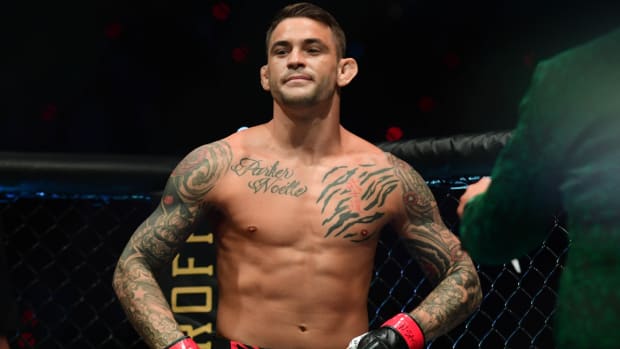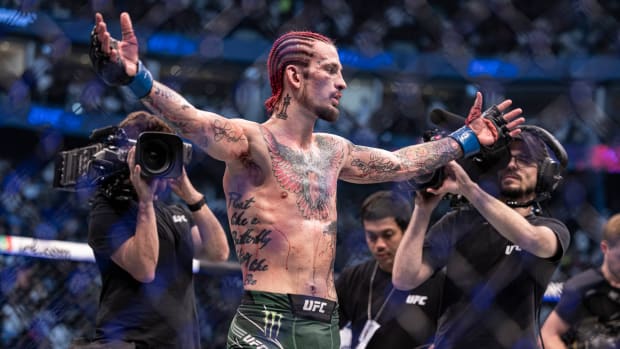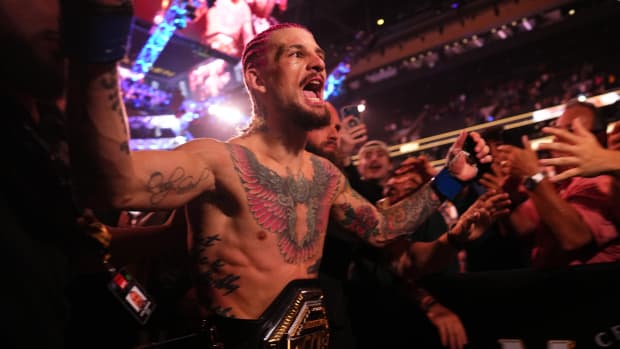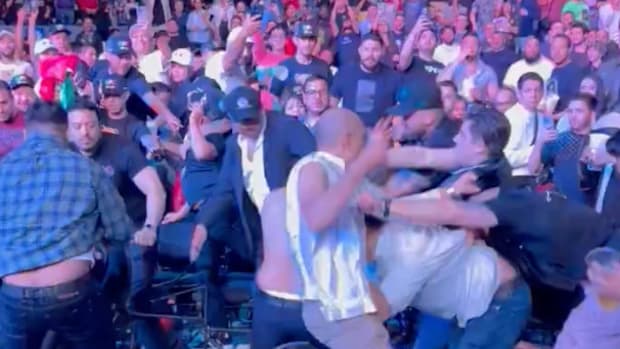Greatest comebacks in MMA history
On Saturday night, Rich Franklin and Wanderlei Silva will both try to re-establish a foothold in the tilting landscape of mixed martial arts. Hence, DanaWhite and the Ultimate Fighting Championship marketing department have come up with UFC 99: The Comeback.
To some degree, the card's moniker is appropriate.
The winner of the headliner will announce his pseudo-relevance in the light heavyweight division, while the loser will slide a little farther into the abyss that marks the end of a hall-of-fame career. Realistically (and sadly), even the winner won't be too far behind (I'm betting on the "Axe Murderer" to stop "Ace").
Let's face it, neither of these guys figures to topple Lyoto Machida or the winner of the Quinton Jackson/Rashad Evans fight. If Evans wins, he's more dangerous than people think and we already know Rampage is a monster.
Most importantly, the Dragon seems to be the purest combat artist of all three. Forgive me if I'm skeptical of how long the "Comeback" will last.
Nah, the career-resurrection angle is purely to sell tickets for this event.
Of course, isn't that the way all of 'em start?
Haven't all the greatest comebacks seemed highly improbable -- if not laughable -- at the time they started? In fact, logic would seem to dictate the most impressive career rebounds should have seemed the most unrealistic in their earliest stages.
That's what makes them so incredible in hindsight -- the fighter beat the odds, often a much more formidable opponent than any human complement.
So, with an eye towards UFC 99 and what could be the beginning of something special, I offer my spin on the top 10 greatest career comebacks in MMA history:
This one opens the list because I'm not sure Cro Cop's gonna make it all the way back.
And I'm not talking about the grotesque head-kick Mirko absorbed from GabrielGonzaga. Nah, I think that fight was already part of Filipovic's attempt to return.
Check out his résumé: the Croatian SWAT team member lost twice in his first 20 fights covering five years and some of the biggest names in the fight game as it was back then. Only Antonio Rodrigo Nogueira and Kevin Randleman beat him.
Then came the marathon war of attrition against Fedor Emelianenko, the fight the "Last Emperor" credits as his toughest to date. Filipovic would go three rounds and 20 minutes with the baddest man on the planet, only to lose a unanimous decision and take immeasurable abuse in the process.
Although Cro Cop would come back to win his next fight against Josh Barnett, he'd lose again in the following bout to Mark Hunt. He'd rattle off another string of victories before transitioning to the newly superior ranks of the UFC and almost getting killed by "Napao."
Then he'd lose again to Cheick Kongo and look in no way, shape, or form like the Cro Cop of old in the process. Now, he's retreated back to his root of K-1 kickboxing.
Who knows if we'll ever see Mirko Filipovic back in the Octagon? Even if we do, it seems unlikely it will be the Cro Cop we remember.
This is sort of a fun one because the more recent crops of MMA fans might not even realize the "Russian Bear" is a fighter. More likely, they'd recognize him from his IMDB page or from movies like 15 Minutes, National Treasure or Bad Boys II.
Don't let the Hollywood stench fool you; Oleg Taktarov is nobody with whom you should trifle.
Oleg is a veteran of the UFC's earliest days, back when it really was a free-for-all.
From 1993 through 1998, Taktarov was a regular and highly-skilled fighter. He notched victories over Tank Abbott and Marco Ruas, he scuffled KenShamrock and Ruas to draws, he tasted defeats cooked up by Dan Severn (twice, the second being a unanimous decision after 30 minutes of slugging), Renzo Gracie and Gary Goodridge.
Then he discovered acting (or maybe it was his goal all along).
Between February of '98 and the end of November in 2007, Oleg Taktarov fought once: a submission victory over Aaron Salinas in 2001. He won again in '07 with a submission of John Marsh for Bodog's promotion.
Most recently, the Russian Bear defeated fellow superstar from antiquity, MarkKerr, with yet another submission.
Two stoppages in two fights after almost a decade away from the endeavor gets Taktarov on this list. If I knew who Marsh was, Oleg would be higher.
Lots of fight fans were stunned speechless when "Shogun" Rua lost to ForrestGriffin in September of 2007, I was one of them.
He had literally run through his Pride FC contemporaries: He was 16-2 with 13 victories coming via technical knock-out or straight KO (usually from kicks or head-stomps), two unanimous decisions (over Antonio Rogerio Nogueira and Kazuhiro Nakamura), and one submission of Kevin Randleman.
He had one early, inexplicable loss to Renato Sobral and a "loss" to MarkColeman, in which an awkward fall broke his arm.
At the time, Mauricio already listed amongst his vanquished Quinton Jackson, Alistair Overeem (twice), Ricardo Arona, Cyrille Diabate, Evangelista Santos and Akihiro Gono, in addition to those mentioned.
So nobody thought he'd lose to a reality show contestant. Clearly not Shogun, who came in lackluster and ill-prepared. The stoppage by Griffin sent Rua looking for answers, answers it took Shogun over 15 months to find.
But find them, he did.
A rusty defeat of Coleman to finally close the chapter on the broken limb and, more persuasively, his destruction of Chuck Liddell has Rua back on track.
I know, G.S.P. looks odd on a list of career comebacks because the 28-year-old hasn't had a ton of adversity in his still-young career.
But, when you avenge the worst upset in MMA history, it qualifies as a grand bounce-back.
I'll handle Rush's defeat at the hands of Matt Serra a little later, but suffice it to say the defeat weighed heavily on St. Pierre. At first, he simply gave credit to Serra and played the gracious loser. Ultimately, however, the attention and hullabaloo got to be too much.
Then came stories of personal problems, family deaths, this and that -- essentially, G.S.P. wanted out from underneath the story and started wriggling. Georges took on a somewhat bitter edge for the first time in interviews.
Finally, two fights and over a year later, St. Pierre got his shot at redemption in the form of a rematch with the Terror. Rush's subsequent annihilation of a tough-as-nails Serra as well as successful title defenses against Jon Fitch and B.J. Penn have returned St. Pierre to the pinnacle of the sport.
Not bad for a guy so recently familiar with its depths.
"Rampage" has always been tenacious -- you don't go on winning jags like those on his résumé against the type of competition he's faced without answering to such description. But his loss to Forrest Griffin was humiliation on a level even Quinton Jackson couldn't handle.
The unanimous decision loss came while Quinton was defending his UFC light heavyweight championship and on the heels of coaching on the seventh season of The Ultimate Fighter -- to a fighter for whom he didn't appear to have much respect.
The combination pushed Rampage passed his mental breaking point.
Shortly thereafter, Jackson was involved in a hit-and-run accident, followed by a police chase. Unless I'm mistaken, there were also rumors about Jackson being under the influence of some suspicious-sounding "medication."
Regardless of where the truth lies in all that, it was clear Rampage didn't take the loss of his belt well. When the best-case scenario involves a police chase, something's wrong. Some wondered if the wrong wouldn't stick with Jackson for a while.
It didn't.
Rampage returned to the Octagon five months later and clobbered the only man to ever beat him twice, the Axe Murderer. For good measure, he beat the suddenly dangerous Keith Jardine.
And, now, he's got Machida and the belt back in his sights.
Royce was the Gracie Family spear -- his ancestors may have invented Gracie Jiu-Jitsu and the early forms of MMA, but Royce was the one who brought it to the masses. He took his family's teachings and made them come to life in the ring, then Octagon.
In the UFC's earliest days, Royce would win three or four fights a night in less time than a modern UFC round lasts (five minutes). And they would ALL be much bigger men than he.
The problem was, Royce Gracie wouldn't knock anybody out. He'd roll around on the ground and, suddenly, the other fighter would be desperately screaming and/or tapping to indicate defeat. Until the opposition caught on and learned some defense.
Then, the fights would still follow the same pattern. They'd just take a lot longer. Following a round-less, 36-minute battle to a draw with Ken Shamrock, action was needed.
So the UFC changed the rules -- gloves, timed rounds with rest in between, weight classes, and more and more until Royce Gracie was effectively nullified. Nullification, along with UFC promotional difficulties, prompted Royce to disappear from the scene.
From 1995 to 2000, Royce didn't fight in an official MMA bout.
In 2000, he'd return to fight twice, the last being a defeat at the hands of the "Gracie Hunter" (Kazushi Sakuraba). He'd fight three times in the next three years, each time on New Year's Eve.
Finally, in 2006 while closing in on 40, Royce Gracie would make his much-anticipated return to the UFC and take on Welterweight Champion Matt Hughes. Over a decade after helping to popularize the organization and sport, the Master had returned.
Except the Master was almost 40 and Matt Hughes was in his prime. Still, Royce fought and, just like always, never gave up in the face of insurmountable odds.
Even after Hughes dislocated his elbow, the ref had to stop the fight. Not Royce.
Like him or not, Matt Serra certainly owns one of the best comebacks in MMA history.
This is a guy who was the first American to be awarded a black belt in Brazilian Jiu-Jitsu by Renzo Gracie, which is kind of like getting ordained by Jesus Christ. Furthermore, he was a UFC mainstay from 2001 through 2005 -- fighting at UFC 31, 33, 36, 39, 41, 46, 48, and 53.
Unfortunately for Matt, he lost half of those fights and almost never beat a substantial opponent. Yves Edwards would be the gaudiest skin Serra hung on his wall.
Consequently, a loss to Karo Parisyan at UFC 53 got Matt the boot from the big leagues in '05.
Of course, Serra would famously return via The Ultimate Fighter reality series. After winning the show's fourth season and earning the guaranteed title shot at G.S.P., the Terror would pull MMA's biggest upset to date.
By knocking out the heavily favored Rush and claiming the Welterweight Championship, Matt Serra completed one of the most improbable treks from MMA purgatory to one of its highest peaks.
"Big Nog" is no stranger to resiliency, so don't count him out in the wake of his slaughter at the hands of Frank Mir.
This guy makes the jump to No. 3 on the list because he's made a career out of coming back from disappointment and tough losses. Shoot, Nogueira's made a life for himself based the concept.
This is one tough guy -- he got run over by a truck at age 11 in Brazil and then survived a four-day coma. In South America. In 1987. Usually, such a combination of misfortune can only be found in an obituary.
So it makes sense that, even a lot of his victories include an early visit to the brink of defeat.
Like when he fought Bob Sapp -- while surrendering 150 pounds -- got drubbed for a spell under the behemoth, only to survive the 10-minute opening stanza and submit the big fella via armbar.
That win was one of 13 straight victories for Big Nog heading into his first match with Fedor Emelianenko. Nogueira entered with the Pride FC heavyweight belt and left a battered, broken warrior.
No surprise, "Minotauro" would return.
He'd reclaim the interim belt in customary fashion, getting shellacked for the first round against Cro Cop, enduring, and then turning the tide into an armbar for another second round win. Then came two more brutal contests with the Last Emperor (a no contest and second unanimous decision loss for Minotauro).
Yep, the man has entered the ring with Fedor Emelianenko three times and lived to tell about it. Even managed to come all the way back from such punishment to capture the UFC Heavyweight Championship in a fight where (shockingly) Big Nog got sent to the canvas early on by Tim Sylvia.
And ultimately won via submission: a guillotine choke this time.
After Mir demolished him, even I'm in the camp saying Antonio Rodrigo Nogueira is done. Which makes Minotauro pretty dangerous if history is any judge.
Even casual fans of MMA probably know this story and were expecting to find Captain America perched atop the list. Well, he's close.
At the seasoned age of 43 (months shy of his 44th birthday), Randy Couture stepped out of retirement and into the arena for another shot at immortality in the Octagon. Actually, the UFC Hall-of-Famer was already immortal in his chosen sport before taking on Tim Sylvia at UFC 68 for the Heavyweight Championship.
Couture burst onto the scene by defeating a white-hot Vitor Belfort, then won his first heavyweight title from Maurice Smith in 1997. He'd win another such title from Kevin Randlemen in 2000.
His next title came in his first fight at a new weight. He took on Chuck Liddell for the interim light heavyweight championship and stopped the Iceman in the third round for the belt. Couture would later unify the championship by taking a unanimous decision from Tito Ortiz.
After losing the belt to Liddell and then failing in his bid to regain it, Randy Couture retired from MMA and entered the UFC Hall of Fame.
A year and a month later, Couture would be back in gloves and staring into the face of a 6-foot-10 giant, who was also the defending heavyweight champ. Randy would dominate Tim Sylvia for the win (even flooring the champ in the opening minutes) and, in the process, become a five-time champion. In addition, the win made Randy the oldest title holder in the sport's history.
Just another day for Captain America.
But it was the second greatest career comeback in the land of mere mortals.
As wonderful as Couture's resurrection is, Frank Mir's effort gets the nod because of the beasts he's had to tackle in his return.
Those of us familiar with Mir know him to be a ... confident gentleman. We also know his reputation as one of the greatest ground fighters the heavyweight division has ever seen. But, when you check his career resume, you don't see a whole lotta support for these tidbits.
Mir's got 12 wins with seven submissions, two technical knockouts, two decisions, and one win by disqualification. His most impressive victories would be the two most recent stoppages: one of Minotauro and the other of BrockLesnar (and possibly the submission of a previously unsubmitted Pete Williams by a shoulder lock subsequently named after Mir).
He's also got three rather questionable defeats: a technical knockout by Brandon Vera, a TKO by Marcio Cruz and a third TKO, courtesy of IanFreeman. All came in the first round.
Doesn't seem like the stuff of legends. Particularly one who's already 30.
Look closer, though, and you'll see a period of dormancy lasting 20 months (from June 2004 until February 2006) in an otherwise busy fighting schedule. A period directly following his first heavyweight title, which he secured by breaking Tim Sylvia's arm.
Odd. At least on the surface.
The rest was necessary, you see, because a car smashed into Frank Mir while he was riding his motorcycle in September of '04. The violent collision snapped Mir's femur (that's the big one) in two places, essentially tore his knee apart, and required major surgery. While recovering, Mir's title was understandably stripped.
There were whispers Mir's career had a fork in it, even if he were physically able to fight again, he'd be a shadow of his former radiant self.
The whispers got louder after the TKO's to Cruz and then to Vera in two of his first three bouts upon returning to the Octagon.
Nobody's whispering anymore. Nobody's even thinking about Mir's demise. Not after an easy submission of Antoni Hardonk, a much harder submission of Lesnar, and his utter domination of Nogueira to regain a piece of the heavyweight belt.
Frank had to come back from devastating injury, debilitating psychological defeats, and he had to do it against some of the best heavyweights MMA currently has to offer.
Mir's already got one hand on the heavyweight championship.
That's one heck of a comeback, the best in MMA history.
And Frank Mir's not done.
